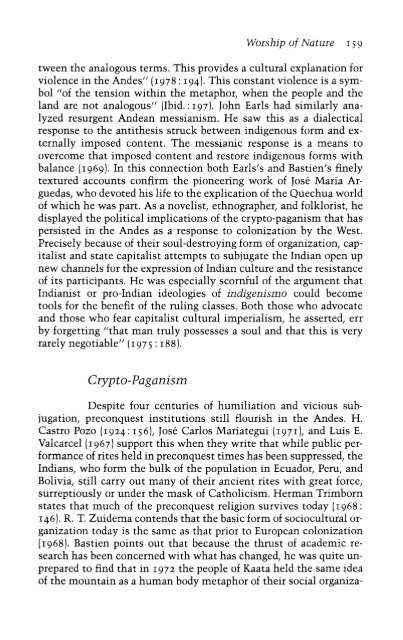The Devil and Commodity Fetishism in South America - autonomous ...
The Devil and Commodity Fetishism in South America - autonomous ...
The Devil and Commodity Fetishism in South America - autonomous ...
You also want an ePaper? Increase the reach of your titles
YUMPU automatically turns print PDFs into web optimized ePapers that Google loves.
Owners <strong>and</strong> Fences 71<br />
lem of labor discipl<strong>in</strong>e afflict<strong>in</strong>g the manager of Japio <strong>in</strong> 1882,—"We<br />
cannot f<strong>in</strong>d workers even though one trips over idlers every day." In<br />
the words of the old mayordomo of the largest estate <strong>in</strong> the southern<br />
Cauca Valley, that of the Holgu<strong>in</strong>s', describ<strong>in</strong>g the return of the<br />
owners <strong>in</strong> 1913, "<strong>The</strong>y came to dom<strong>in</strong>ate the negroes <strong>and</strong> exp<strong>and</strong><br />
their hacienda." Rural proletarianization began <strong>in</strong> earnest. National<br />
censuses <strong>in</strong>dicate that wage laborers constituted a mere fifth of the<br />
number of smallholders <strong>in</strong> 1912. But by 1938 the proportions had reversed.<br />
<strong>The</strong> wage laborers were a third larger than the number of<br />
smallholders <strong>and</strong> had <strong>in</strong>creased fivefold.<br />
Why wasn't a capitalist economy developed on the basis of commercial<br />
peasant farmers? Why did it develop by means of large estates<br />
<strong>and</strong> wage labor? <strong>The</strong> social organization of the peasants posed<br />
an obstacle to capitalist <strong>in</strong>stitutions. <strong>The</strong> work<strong>in</strong>g of l<strong>and</strong> was<br />
shrouded <strong>in</strong> a maze of <strong>in</strong>tensely personalistic relations based on different<br />
rights <strong>and</strong> obligations woven <strong>in</strong>to a k<strong>in</strong>ship system of multiple<br />
marital unions. To some extent the peasants produced for the national<br />
market, but consumed few market commodities. <strong>The</strong>y were<br />
neither easily able nor zealous <strong>in</strong> exp<strong>and</strong><strong>in</strong>g a surplus. Without the<br />
clearly drawn l<strong>in</strong>es of private property <strong>in</strong> the modern bourgeois<br />
sense, they were refractory to the f<strong>in</strong>ancial <strong>in</strong>stitutions <strong>and</strong> <strong>in</strong>ducements<br />
that met <strong>and</strong> attracted the rul<strong>in</strong>g classes. <strong>The</strong> peasants' bonds<br />
of k<strong>in</strong> <strong>and</strong> k<strong>in</strong>d meant that capital accumulation was a virtual impossibility.<br />
Wealth, not capital, might be amassed, but only to be divided<br />
among the succeed<strong>in</strong>g generations. Of course, merchant capital<br />
could coexist with this form of social organization, but s<strong>in</strong>ce<br />
national capital accumulation dem<strong>and</strong>ed an ever-<strong>in</strong>creas<strong>in</strong>g domestic<br />
market, peasants who cont<strong>in</strong>ued to practice self-subsistence<br />
were an obstacle to progress. Whatever the <strong>in</strong>tricate calculus of the<br />
emerg<strong>in</strong>g system, its <strong>in</strong>itial push was to destroy a form of social organization<br />
embedded <strong>in</strong> a nonmarket mode of us<strong>in</strong>g <strong>and</strong> shar<strong>in</strong>g<br />
l<strong>and</strong>.<br />
Describ<strong>in</strong>g the beg<strong>in</strong>n<strong>in</strong>g of enclosures, an old peasant tells how<br />
Jaime Gomez came. "He began to usurp, to rob, to damage, <strong>and</strong> to<br />
disquiet the residents of Barragan, Qu<strong>in</strong>tero, Ob<strong>and</strong>o, <strong>and</strong> so on.<br />
<strong>The</strong>n you had to flee or sell. In Barragan he broke the houses <strong>and</strong><br />
erased the communism, the comuneros, because there were comuneios<br />
there." Systems of teamwork, festive labor parties <strong>and</strong> reciprocal<br />
labor exchange, were <strong>in</strong> force. "<strong>The</strong> m<strong>in</strong>ga [festive labor]. In<br />
that week you sk<strong>in</strong> a pig, a chicken, a calf, or whatever, <strong>and</strong> <strong>in</strong>vite<br />
your neighbors to work. <strong>The</strong>y are work<strong>in</strong>g <strong>and</strong> others are prepar<strong>in</strong>g<br />
the meal from those animals. One or two days, whatever it is. One<br />
month or a week later I do the same. This we called the m<strong>in</strong>ga. It's
















